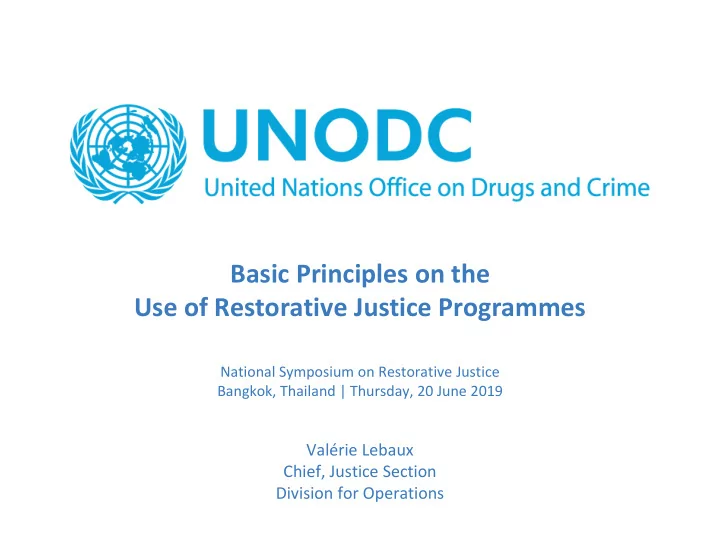

Basic Principles on the Use of Restorative Justice Programmes National Symposium on Restorative Justice Bangkok, Thailand | Thursday, 20 June 2019 Valérie Lebaux Chief, Justice Section Division for Operations
Restorative Justice • Both an approach to crime that operates on a different set of principles than the conventional criminal justice system and a criminal justice process Process: brings together the victim and the offender to Approach: crime causes participate together in the fundamental harm to resolution of matters arising individuals, communities from the crime, generally and society as a whole with the help of a facilitator • A key measure in increasing access to justice by giving those affected by the crime a voice and power to address the harm (often the only measure that allows victims of crime to participate!)
Basic Principles on the Use of Restorative Justice Programmes (2002) • Adopted by the Economic and Social Council in 2002 in response to the growing use of restorative justice by Member States • Provide guidance in developing restorative justice at any stage of the criminal justice system • Encourage Member States to adopt and standardize restorative justice, with legislative authority if necessary • Articulate fundamental procedural safeguards to guarantee fairness to the offenders and victims
Rights of parties to ensure fairness of process The right of minors to the assistance of The right to be fully a parent or informed guardian The right to consult The right not to Rights of victims , with legal counsel participate offenders , and other individuals affected by a crime who may be involved in the process (para. 13)
Legal and policy safeguards Participation of an Agreements should be Confidentiality of offender is not evidence voluntary and be proceedings of guilt reasonable (para. 14) (para. 8) (para. 7) No increased Failure to reach an Judicial supervision punishment for failure to agreement implement an agreement (para. 15) (para. 16) (para. 17)
Other relevant international standards and norms Declaration of Basic Principles of Justice for Victims of Crime and Abuse of Power (1989) United Nations Standard Minimum Rules for Non- custodial Measures (the Tokyo Rules, 1990) United Nations Standard Minimum Rules for the Treatment of Prisoners (the Nelson Mandela Rules, 2015) United Nations Rules for the Treatment of Women Prisoners and Non-custodial Measures for Women Offenders (the Bangkok Rules, 2010)
Other relevant international standards and norms (Cont.) The Convention of the Rights of the Child (CRC) United Nations Standard Minimum Rules for the Administration of Juvenile Justice (the Beijing Rules, 1985) United Nations Guidelines for the Prevention of Juvenile Delinquency (the Riyadh Guidelines, 1990) United Nations Model Strategies and Practical Measures on the Elimination of Violence against Children in the Field of Crime Prevention and Criminal Justice (2014)
Regional Instruments The The Council of European Europe Union Recommendation (2018) 8 concerning Victims’ Rights restorative justice in Directive criminal matters (2012)
Restorative justice processes in the context of violence against women The Committee on the Elimination of Discrimination against Women • The rights to use mediation, conciliation, arbitration and collaborative dispute resolution •These procedures should not restrict women’s access to judicial or other remedies and not lead to further violations of rights • Free and informed consent of victims, no indicators of further risks The Commission on the Status of Women • Prohibit compulsory and forced alternative dispute resolution processes, including forced mediation and conciliation, in relation to all forms of violence against women and girls The Council of Europe Convention on preventing and combating violence against women and domestic violence • Also prohibit the mandatory use of alternative dispute resolution processes
Thank You Valérie Lebaux Chief, Justice Section Division for Operations UNODC
Recommend
More recommend